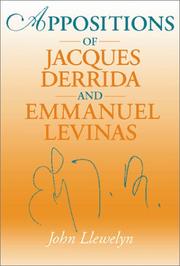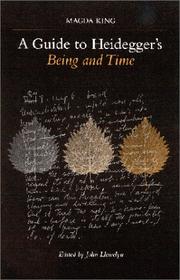Book
ISBN: 0312194102 Year: 1986 Publisher: New York
Abstract | Keywords | Export | Availability | Bookmark
 Loading...
Loading...Choose an application
- Reference Manager
- EndNote
- RefWorks (Direct export to RefWorks)

ISBN: 0253214939 0253340187 Year: 2002 Publisher: Bloomington Indiana university press
Abstract | Keywords | Export | Availability | Bookmark
 Loading...
Loading...Choose an application
- Reference Manager
- EndNote
- RefWorks (Direct export to RefWorks)
Considers the ways in which the writings of Derrida and Levinas illuminate each other's thought. If not simple opposition or simple juxtaposition, what is the relation between the writings to which Derrida and Levinas appose their signatures? What would each endorse in the writings of the other? What is it to sign and endorse? How does one assume responsibility, and how does one avoid assuming it? These are some of the probing questions that the prominent Continental philosopher, John Llewelyn takes up in "Appositions", which brings together and synthesises fifteen essays written during the past twenty years.Drawing out the metaphor of the Greek letter chi, or "x", Llewelyn apposes the discussions of the two philosophers, applying their thought to one another. In considering the work of Derrida and Levinas from the points of view of philosophy, linguistics, logic, and theology, Llewelyn invokes a diverse array of philosophers, theologians, and literary figures, including Austin, Defoe, Hegel, Heidegger, Jankelevitch, Kant, Mallarme, Plato, Ponge, Ramsey, Rosenzweig, Russell, Saussure, and Valery. This book by a powerfully original thinker and first-rate interpreter is essential reading for all those interested in the writings of Derrida and Levinas and in the ways in which their thinking intersects.
Book
ISBN: 033354448X Year: 1991 Publisher: Basingstoke Macmillan
Abstract | Keywords | Export | Availability | Bookmark
 Loading...
Loading...Choose an application
- Reference Manager
- EndNote
- RefWorks (Direct export to RefWorks)
Digital
ISBN: 9781474408950 Year: 2015 Publisher: Edinburgh Edinburgh University Press
Abstract | Keywords | Export | Availability | Bookmark
 Loading...
Loading...Choose an application
- Reference Manager
- EndNote
- RefWorks (Direct export to RefWorks)
Metaphysics --- English language --- Duns Scotus, John --- Hopkins, Gerard Manley
Article
Abstract | Keywords | Export | Availability | Bookmark
 Loading...
Loading...Choose an application
- Reference Manager
- EndNote
- RefWorks (Direct export to RefWorks)
Digital
ISBN: 9781474408950 9781474408943 Year: 2022 Publisher: Edinburgh Edinburgh University Press
Abstract | Keywords | Export | Availability | Bookmark
 Loading...
Loading...Choose an application
- Reference Manager
- EndNote
- RefWorks (Direct export to RefWorks)

ISBN: 0791448002 9780791448007 Year: 2001 Publisher: Albany (N.Y.): State university of New York press,
Abstract | Keywords | Export | Availability | Bookmark
 Loading...
Loading...Choose an application
- Reference Manager
- EndNote
- RefWorks (Direct export to RefWorks)
Metaphysics --- Heidegger, Martin --- Ontology. --- Space and time. --- Ontology --- Space and time --- Space of more than three dimensions --- Space-time --- Space-time continuum --- Space-times --- Spacetime --- Time and space --- Being --- Heidegger, Martin, --- Fourth dimension --- Infinite --- Philosophy --- Space sciences --- Time --- Beginning --- Hyperspace --- Relativity (Physics) --- Necessity (Philosophy) --- Substance (Philosophy)
Book
Year: 1943 Publisher: London : MacMillan,
Abstract | Keywords | Export | Availability | Bookmark
 Loading...
Loading...Choose an application
- Reference Manager
- EndNote
- RefWorks (Direct export to RefWorks)
Book

ISBN: 9789186883331 918688333X Year: 2015 Publisher: Stockholm Axl Books
Abstract | Keywords | Export | Availability | Bookmark
 Loading...
Loading...Choose an application
- Reference Manager
- EndNote
- RefWorks (Direct export to RefWorks)
Ignorance is an intellectual defect, imperfection, privation, or shortcoming." So begins James Ferrier's "The Agnoiology," the section of his treatise, 'The Institutes of Metaphysic' (1854), in which he describes a theory of ignorance. In sympathy with Ferrier, Ignorance between knowing and not knowing concerns the nature of ignorance, its relationship to knowledge and its differentiation from merely not knowing. However, this book additionally considers how different forms of ignorance exert force within the creation and reception of art. These topics are explored through a range of essays drawn from contributors within the fields of philosophy, literary theory, and art criticism. Ignorance provides a reflection in negative to the normative structure of knowledge. It is the absence of knowledge that we "should have." This moral dimension can be seen in the persona, created by the medieval philosopher Nicholas of Cusa, of "the idiot," who is aware of his ignorance yet this awareness brings with it a humility, or the assumed ignorance within the Socratic dialogues. This book traces connections between ignorance within the philosophical realm - as both a strategy within discourse and as an object of inquiry - and how it occurs within art. Particular consideration is paid to art's utilization of ignorance as a means for establishing uncertainty and ambiguity. Within this publication ignorance is not solely understood as a state one seeks to escape from but rather, through its role within art and philosophy, it offers the potential to other forms of articulation and understanding.
Book

ISBN: 9780823279531 Year: 2018 Publisher: New York, NY
Abstract | Keywords | Export | Availability | Bookmark
 Loading...
Loading...Choose an application
- Reference Manager
- EndNote
- RefWorks (Direct export to RefWorks)

 Search
Search Feedback
Feedback About UniCat
About UniCat  Help
Help News
News